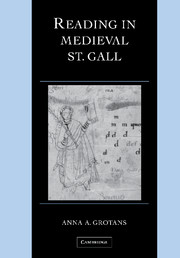Book contents
- Frontmatter
- Dedication
- Contents
- List of plates
- Acknowledgments
- List of abbreviations
- Manuscript punctuation and other symbols
- Introduction
- 1 Medieval reading
- 2 Education at ST. Gall
- 3 Language use and choice
- 4 The ST. Gall Tractate
- 5 Discretio in the classroom
- 6 Accentus
- 7 Spelling for reading
- Bibliography
- Index of manuscripts
- General index
Introduction
Published online by Cambridge University Press: 13 May 2010
- Frontmatter
- Dedication
- Contents
- List of plates
- Acknowledgments
- List of abbreviations
- Manuscript punctuation and other symbols
- Introduction
- 1 Medieval reading
- 2 Education at ST. Gall
- 3 Language use and choice
- 4 The ST. Gall Tractate
- 5 Discretio in the classroom
- 6 Accentus
- 7 Spelling for reading
- Bibliography
- Index of manuscripts
- General index
Summary
Nothing is more commonplace than the reading experience, and yet nothing is more unknown.
Tzvetan TodorovIn recent decades several pioneering studies have changed the way we look at literacy in the medieval West. They have provided important insights into the conditions for literacy, its extent, growth, function and social and political implications as well as discussing the transition from orality to literacy and the influences each of these had on the other. Closely linked with the topic of literacy is the history of reading and writing. What was read, why was it read and, important for the present study, how was it read? The history of writing, in addition to investigating the creative act of composition itself, also studies the actual act of inscription and the written culture which it produces. From the perspective of manuscript studies, it looks at what writing materials were used, how letter forms were developed, shaped and combined to form words, and how these words were organized into texts on the page and in a codex. The history of reading and writing are related, since how texts were written often influenced how they were read and, conversely, the prerequisites of reading directly influenced developments in writing. Moreover, both are directly related to the study of how literacy was acquired.
My study investigates classroom reading, or lectio, as it was practised in the Abbey of St. Gall at the turn of the second millennium.
Information
- Type
- Chapter
- Information
- Reading in Medieval St. Gall , pp. 1 - 14Publisher: Cambridge University PressPrint publication year: 2006
